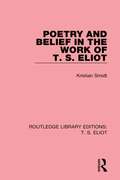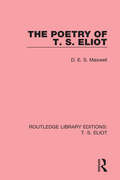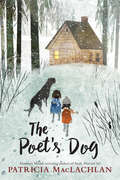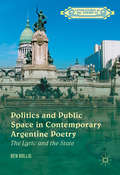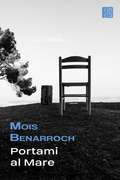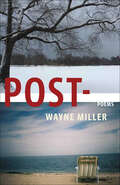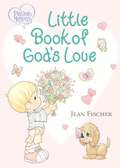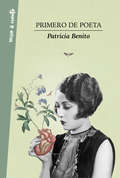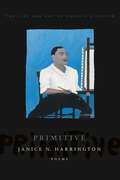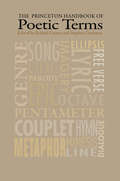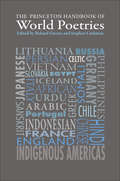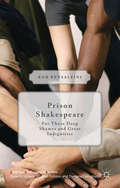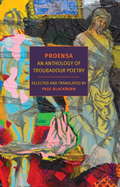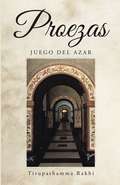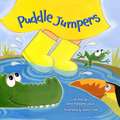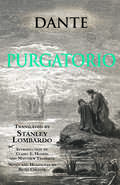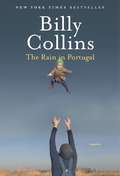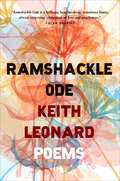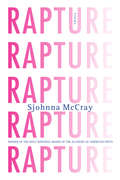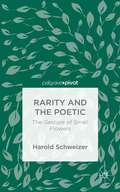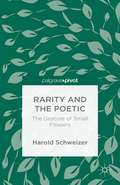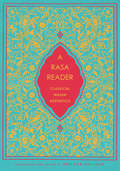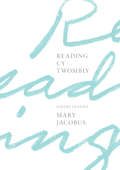- Table View
- List View
Poetry and Belief in the Work of T. S. Eliot (Routledge Library Editions: T. S. Eliot #7)
by Kristian SmidtThis title, first published in 1961, explores the general background of attitudes, beliefs and ideas from which Eliot’s works have originated. This study examines the influences of Eliot’s work, and includes Eliot’s personal views as told to the author. The book also looks at technique, structure and imagery of his poetry. This title will be of interest to students of literature.
The Poetry of T. S. Eliot (Routledge Library Editions: T. S. Eliot #6)
by D. E. MaxwellIn this fascinating and revealing book, first published in 1952, Maxwell shows the development of Eliot’s poetry and poetic thought in the light of his political and religious attachments. This study traces Eliot’s style from the earliest poems to the Quartets, and examines the characteristics of Eliot’s earlier work adumbrate that of his maturity. The Poetry of T. S. Eliot is essential reading for students of literature.
The Poet's Dog
by Patricia MaclachlanFrom Newbery Medal winner Patricia MacLachlan comes a poignant story about two children, a poet, and a dog and how they help one another survive loss and recapture love.Teddy is a gifted dog. Raised in a cabin by a poet named Sylvan, he grew up listening to sonnets read aloud and the comforting clicking of a keyboard. Although Teddy understands words, Sylvan always told him there are only two kinds of people in the world who can hear Teddy speak: poets and children.Then one day Teddy learns that Sylvan was right. When Teddy finds Nickel and Flora trapped in a snowstorm, he tells them that he will bring them home--and they understand him. The children are afraid of the howling wind, but not of Teddy's words. They follow him to a cabin in the woods, where the dog used to live with Sylvan . . . only now his owner is gone.As they hole up in the cabin for shelter, Teddy is flooded with memories of Sylvan. What will Teddy do when his new friends go home? Can they help one another find what they have lost?
Politics and Public Space in Contemporary Argentine Poetry
by Ben BolligThis book addresses the connection between political themes and literary form in the most recent Argentine poetry. Ben Bollig uses the concepts of "lyric" and "state" as twin coordinates for both an assessment of how Argentinian poets have conceived a political role for their work and how poems come to speak to us about politics. Drawing on concepts from contemporary literary theory, this striking study combines textual analysis with historical research to shed light on the ways in which new modes of circulation help to shape poetry today.
Portami al mare
by Daniela Giovannetti Mois BenarrochAcclamato come uno dei principali poeti israeliani, la poesia di Mois Benarroch è stata pubblicata in decine di lingue, tra cui urdu e cinese. Julia Uceda ritiene Benarroch il detentore della memoria del mondo con la sua poesia, mentre Jose Luis Garcia Martin pensa che i suoi componimenti siano al di là della poesia, un vero e proprio documento.
Post-: Poems
by Wayne MillerThe poems of this fourth collection from Wayne Miller exist in the wake of catastrophe. It is a world populated by rogue gunmen on shooting sprees, a world where the only inheritance a father has to pass on is his debt. In this world, every box could be a bomb and what comes after is what is lived. And yet, this painful past is not set in stone. The past becomes the present, yielding toward an immediate future.The collection coalesces around a series of "post-elegies" triggered by three occurrences: the birth of his child, the death of his father, and his experience of the seeming explosion of sociohistorical and political conflict and violence over the past decade. Throughout this series, Miller processes grief, but also cuts through pain to open up a way forward in the aftermath of shared loss. Post- thrums with pathos and humor, pain and the beauty of living.
Postcolonial Poetry In English
by Rajeev S. PatkeThis book introduces readers to a body of poetry whose unique relation to language and history gives it a dual role in contemporary societies. On the one hand, this poetry bears witness to the residual force of colonial histories; on the other, it shows how that force may be turned to new forms of linguistic and cultural empowerment. Many books with 'postcolonial' in their titles ignore or marginalize the genre of poetry. Others address it within the boundaries of a single nation or region. Their insights leave room for another kind of project, which establishes connections between contemporary poetry and colonial history, and provides comparisons between the literary decolonization of societies linked
Precious Moments: Little Book of God's Love (Precious Moments)
by Jean FischerCelebrate with your little one how we can receive and share God&’s amazing love. The classic Precious Moments illustrations, sweet poems, and Bible verses remind us that from twinkling stars and bright sunshine to giggles and hugs and special friends, God&’s love is all around us.Your little one will be filled with God&’s love as you share this charming padded board book that gently reminds your child about God&’s goodness.Precious Moments: Little Book of God&’s Love …Is perfect for children ages 0 to 4;Includes whimsical and nostalgic Precious Moments illustrations and larger sized text for an easy-to-read experience;Features engaging rhymes, prayers, and scriptures;Is a wonderful gift for decisions of faith, baptisms, baby showers, baby dedications, birthdays, and Valentine&’s DayCreate lasting memories with this adorable childhood keepsake as your children learn about God&’s love while spending precious moments with you.Since 1978, Precious Moments has grown into a brand recognized worldwide, with more than 14.5 million books and Bibles sold with Thomas Nelson. Precious Moments serves as a symbol of the emotions experienced during life&’s milestones including weddings, births, christenings, and special everyday moments.
Primero de poeta
by Patricia BenitoEl libro de poesía que, autoeditado por su autora, escaló las listas de Amazon y ha conquistado a miles de lectores. «Vive, joder, vive. Y si algo no te gusta, cámbialo. Y si algo te da miedo, supéralo. Y si algo te enamora, agárralo.» Primero de poeta son todos los papeles que rellené y quemé, todos los pasos que no di, las vidas que perdí. Todas las declaraciones de amor que callé, los sueños que rompí, los miedos de los que aprendí. Es mi impaciencia, mis ganas de sentir y el pánico. Es descubrir que mis miedos siempre ganan la partida. Es empujarte a que te vayas por si te acercas demasiado. Es querer que te acerques demasiado. Primero de poeta son todos mis errores. Y mi cura. La opinión de los lectores:«Cada página es una confesión desnuda y sincera de la autora, de esas que te hacen partícipe de principio a fin porque sabes que son auténticas, porque están escritas con el lenguaje que compartimos todos, el del dolor y el de la alegría, el del miedo y el del amor, en definitiva, el lenguaje del alma. Recomiendo tenerlo para ojearlo con cuidado de vez en cuando, porque al menos a mí, me hace sentir cosas de las cuales no quiero abusar y "gastarlas" demasiado rápido.»Chris «Para los amantes del buen gusto, de lo bonito, de lo que toca el alma. Por encontrarme reflejada en muchos de esos renglones, hacerme sonreír y también hacerme reflexionar. Por todo eso y por mucho más, es un libro para leer al menos una vez en la vida.»Inma «A cada poema te enamoras más de Patricia, porque te hace sentir y recordar emociones cotidianas que a veces podemos tener olvidadas. Recomendable 100%, para leer y releer.»Inma Naroi «Una poesía moderna, directa, de pensamientos ágiles y muy cercana, con partes que invitan a la reflexión.»Cliente Amazon
Primero de poeta
by Patricia BenitoEl libro de poesía que, autoeditado por su autora, escaló las listas de Amazon y ha conquistado a miles de lectores. «Vive, joder, vive. Y si algo no te gusta, cámbialo. Y si algo te da miedo, supéralo. Y si algo te enamora, agárralo.» Primero de poeta son todos los papeles que rellené y quemé, todos los pasos que no di, las vidas que perdí. Todas las declaraciones de amor que callé, los sueños que rompí, los miedos de los que aprendí. Es mi impaciencia, mis ganas de sentir y el pánico. Es descubrir que mis miedos siempre ganan la partida. Es empujarte a que te vayas por si te acercas demasiado. Es querer que te acerques demasiado. Primero de poeta son todos mis errores. Y mi cura. La opinión de los lectores:«Cada página es una confesión desnuda y sincera de la autora, de esas que te hacen partícipe de principio a fin porque sabes que son auténticas, porque están escritas con el lenguaje que compartimos todos, el del dolor y el de la alegría, el del miedo y el del amor, en definitiva, el lenguaje del alma. Recomiendo tenerlo para ojearlo con cuidado de vez en cuando, porque al menos a mí, me hace sentir cosas de las cuales no quiero abusar y "gastarlas" demasiado rápido.»Chris «Para los amantes del buen gusto, de lo bonito, de lo que toca el alma. Por encontrarme reflejada en muchos de esos renglones, hacerme sonreír y también hacerme reflexionar. Por todo eso y por mucho más, es un libro para leer al menos una vez en la vida.»Inma «A cada poema te enamoras más de Patricia, porque te hace sentir y recordar emociones cotidianas que a veces podemos tener olvidadas. Recomendable 100%, para leer y releer.»Inma Naroi «Una poesía moderna, directa, de pensamientos ágiles y muy cercana, con partes que invitan a la reflexión.»Juan
Primitive: The Art and Life of Horace H. Pippin
by Janice N. HarringtonA biographical reflection on the art and life of Horace H. Pippin-the best-known African-American artist of his time-Primitive is a critique on current perceptions surrounding African-American folk art, as well as the absence of key African-American history in present-day curricula. Award-winning poet Janice Harrington connects readers with a fascinating, odds-defying artist, all while underscoring the human need for artistic expression.
The Princeton Handbook of Poetic Terms: Third Edition
by Roland Greene Stephen CushmanThe Princeton Handbook of Poetic Terms--drawn from the latest edition of the acclaimed Princeton Encyclopedia of Poetry and Poetics--provides an authoritative guide to the most important terms in the study of poetry and literature. Featuring 226 fully revised and updated entries, including 100 that are new to this edition, the book offers clear and insightful definitions and discussions of critical concepts, genres, forms, movements, and poetic elements, followed by invaluable, up-to-date bibliographies that guide users to further reading and research. Because the entries are carefully selected and adapted from the Princeton Encyclopedia, the Handbook has unrivalled breadth and depth for a book of its kind, in a convenient, portable size. Fully indexed for the first time and complete with an introduction by the editors, this is an essential volume for all literature students, teachers, and researchers, as well as other readers and writers.Drawn from the latest edition of the acclaimed Princeton Encyclopedia of Poetry and PoeticsProvides 226 fully updated and authoritative entries, including 100 new to this edition, written by an international team of leading scholarsFeatures entries on critical concepts (canon, mimesis, prosody, syntax); genres, forms, and movements (ballad, blank verse, confessional poetry, ode); and terms (apostrophe, hypotaxis and parataxis, meter, tone)Includes an introduction, bibliographies, cross-references, and a full index
The Princeton Handbook of World Poetries
by Roland Greene Stephen CushmanThe Princeton Handbook of World Poetries--drawn from the latest edition of the acclaimed Princeton Encyclopedia of Poetry and Poetics--provides a comprehensive and authoritative survey of the history and practice of poetry in more than 100 major regional, national, and diasporic literatures and language traditions around the globe. With more than 165 entries, the book combines broad overviews and focused accounts to give extensive coverage of poetic traditions throughout the world. For students, teachers, researchers, poets, and other readers, it supplies a one-of-a-kind resource, offering in-depth treatment of Indo-European poetries (all the major Celtic, Slavic, Germanic, and Romance languages, and others); ancient Middle Eastern poetries (Hebrew, Persian, Sumerian, and Assyro-Babylonian); subcontinental Indian poetries (Bengali, Hindi, Marathi, Punjabi, Sanskrit, Tamil, Urdu, and more); Asian and Pacific poetries (Chinese, Japanese, Korean, Vietnamese, Mongolian, Nepalese, Thai, and Tibetan); Spanish American poetries (those of Mexico, Peru, Argentina, Chile, and many other Latin American countries); indigenous American poetries (Guaraní, Inuit, and Navajo); and African poetries (those of Ethiopia, Somalia, South Africa, and other countries, and including African languages, English, French, and Portuguese). Complete with an introduction by the editors, this is an essential volume for anyone interested in understanding poetry in an international context.Drawn from the latest edition of the acclaimed Princeton Encyclopedia of Poetry and PoeticsProvides more than 165 authoritative entries on poetry in more than 100 regional, national, and diasporic literatures and language traditions throughout the worldFeatures extensive coverage of non-Western poetic traditionsIncludes an introduction, bibliographies, cross-references, and a general index
Prison Shakespeare: For These Deep Shames and Great Indignities (Palgrave Shakespeare Studies)
by Rob PensalfiniThis book explores the development of the global phenomenon of Prison Shakespeare, from its emergence in the 1980s to the present day. It provides a succinct history of the phenomenon and its spread before going on to explore one case study the Queensland Shakespeare Ensemble's (Australia) Shakespeare Prison Project in detail. The book then analyses the phenomenon from a number of perspectives, and evaluates a number of claims made about the outcomes of such programs, particularly as they relate to offender health and behaviour. Unlike previous works on the topic, which are largely individual case studies, this book focuses not only on Prison Shakespeare's impact on the prisoners who directly participate, but also on prison culture and on broader social attitudes towards both prisoners and Shakespeare.
Proensa: An Anthology of Troubadour Poetry
by George Economou Paul BlackburnIt was out of medieval Provence--Proensa--that the ethos of courtly love emerged, and it was in the poetry of the Provençal troubadours that it found its perfect expression. Their poetry was also a central inspiration for Dante and his Italian contemporaries, propagators of the modern vernacular lyric, and seven centuries later it was no less important to the modernist Ezra Pound. These poems, a source to which poetry has returned again and again in search of renewal, are subtle, startling, earthy, erotic, and supremely musical.The poet Paul Blackburn studied and translated the troubadours for twenty years, and the result of that long commitment is Proensa, an anthology of thirty poets of the eleventh through thirteenth centuries, which has since established itself not only as a powerful and faithful work of translation but as a work of poetry in its own right. Blackburn's Proensa, George Economou writes, "will take its place among Gavin Douglas' Aeneid, Golding's Metamorphoses, the Homer of Chapman, Pope, and Lattimore, Waley's Japanese, and Pound's Chinese, Italian, and Old English."
Proezas: Juego del azar
by Tirupathamma RakhiLa compilación de cosechas en pensamientos, coraza de nieves por alimentar almas desordenadas y escafandras aún por ser amaestradas, no hay tiempo para el razonamiento. <P><P>Hay un sendero que empezó con dudas, miedos, terrores y escalofriantes sueños que no dejan dormir en las noches de día. Donde las historias se quedan entre páginas blancas esperando a que sean escritas, diseñando fábulas en otros parajes, copos de sangre y lluvias de bochornosas miradas. <P><P>¿Andarán las palabras en busca de un cuerpo fértil de santos o de un jardín adornado de veneno para ser absorbido por un último aliento, suspiro hechizado? Si así es, ¿Quién es la porcelana descuidada con la gala de ausencias entre perlas de hierro, barro de pétalos? ¿Quién dejará huellas en las cenizas de un fénix en enjambre? <P><P>Por qué este repentino escalofrío en la tenebrosidad de las danzas sin melodías, sacudida de confusiones, memorias de veintidós años de reflejos. La compilación de cosechas en pensamientos, coraza de nieves por alimentar almas desordenadas y escafandras aún por ser amaestradas, no hay tiempo para el razonamiento.
Puddle Jumpers
by Anne Margaret LewisIt’s a rainy day in the month of May and Sam spots a rainbow, and then a puddle. A perfect spring puddle. His mother warns, "No! No jumping in puddles! You must keep clean today!” but Sam can’t stop himself from testing the water with his galoshes. And then the puddle invites him to play. The puddle whispers, "Jump, Puddle Jumper, jump!” and with that very first jump, Sam is off on an adventure of the imagination. He’ll be a frog in a pond, with a hat and some spots and a magic wand. He’ll be a crocodile with pink polka dots and teeth like blades, and a polar bear with purple polar hair. He’s going to jump, leap, dance, plunge, swim, and jump again. Sam is having so much fun in his puddle that even Mom can’t resist. With a leap and a thwump, she’s jumping too, cheering, "Jump, Puddle Jumper, jump!” This happy picture book celebrates the simple, pure joy of jumping in a rain puddle. Nancy Cote’s cheerful illustrations are full of kid appeal, a perfect match to a story that captures the magic of being a child. Let your imagination take you on your own adventure the next time you encounter an irresistible puddle. Aimed for children ages 3 to 6, this is a charming book about letting your imagination run wild and also about the joys children can find in even just a simple rain puddle. Encouraging kids to explore their outside world provides important developmental play for kids and parents will find the mom's reluctance and then acquiescence a good reminder that adults need to enter the world of children in order to allow them to explore their world and to learn from it.
Purgatorio
by Dante Stanley Lombardo Claire Honess Matthew Treheme Ruth ChesterLike his groundbreaking Inferno (Hackett, 2009) and Paradiso (Hackett, 2017), Stanley Lombardo's Purgatorio features a close yet dynamic verse translation, innovative verse paragraphing for reader-friendliness, and a facing-page Italian text. It also offers judicious headnotes and notes by Ruth Chester and an Introduction by Claire E. Honess and Matthew Treherne.
The Rain in Portugal: Poems
by Billy CollinsFrom former U.S. Poet Laureate Billy Collins comes a twelfth collection of poetry offering nearly fifty new poems that showcase the generosity, wit, and imaginative play that prompted The Wall Street Journal to call him "America's favorite poet." The Rain in Portugal--a title that admits he's not much of a rhymer--sheds Collins's ironic light on such subjects as travel and art, cats and dogs, loneliness and love, beauty and death. His tones range from the whimsical--"the dogs of Minneapolis . . . / have no idea they're in Minneapolis"--to the elegiac in a reaction to the death of Seamus Heaney. A student of the everyday, here Collins contemplates a weather vane, a still life painting, the calendar, and a child lost at a beach. His imaginative fabrications have Shakespeare flying comfortably in first class and Keith Richards supporting the globe on his head. By turns entertaining, engaging, and enlightening, The Rain in Portugal amounts to another chorus of poems from one of the most respected and familiar voices in the world of American poetry. On Rhyme It's possible that a stitch in time might save as many as twelve or as few as three, and I have no trouble remembering that September has thirty days. So do June, November, and April. I like a cat wearing a chapeau or a trilby, Little Jack Horner sitting on a sofa, old men who are not from Nantucket, and how life can seem almost unreal when you are gently rowing a boat down a stream. That's why instead of recalling today that it mostly pours in Spain, I am going to picture the rain in Portugal, how it falls on the hillside vineyards, on the surface of the deep harbors where fishing boats are swaying, and in the narrow alleys of the cities where three boys in tee shirts are kicking a soccer ball in the rain, ignoring the window-cries of their mothers.
Ramshackle Ode
by Keith Leonard"Intriguing and triumphant, Leonard&’s collection embodies the subject matter it so aptly depicts, whether it&’s a storm or steeple or meadow."—Booklist "In his lovely first collection, Pushcart Prize nominee Leonard offers poems both tough and tender about becoming a man—effectively so, as these works are not full of false bravado but touching reflection...Charmed and sturdy poems for a wide range of readers."—Library Journal "Keith Leonard&’s Ramshackle Ode is a brilliant, heart breaking, sometimes funny, always surprising celebration of love and attachment, of all the ways our connection to others—friends, lovers, children—makes us hostages to fortune. The force of imagination and the urgent desire to praise, to care for and cultivate is always at every point tested by the equal force of depredation and defilement. This is a terrific and memorable first book. Leonard&’s voice is powerfully distinct and fresh, and it&’s one I&’m sure we&’ll be hearing with gratitude for years to come."—Alan Shapiro "The poems in this solid collection offer praise for the everyday world, even if coming to terms with that world entails a measure of surrender. That world is given to us, we are included in it, and yet the heart and the mind must be pried open in order to receive and realize how much of that world may lie beyond us. Poetry is the ages-old means to see beyond, to glimpse what&’s out there and to praise even what we don&’t yet know. These poems do not linger on grief; instead, they reveal a heart that has been opened to love and a mind flung out to wonder. That is the solemn human journey. No rest for the wicked, is the common expression. No rest for the joyful and compassionate either. That is the discovery these poems field, like pop-flies and grounders in a backyard baseball game played so long ago in youth it has the resonance of myth. These poems have earned their wisdom, and this book is a gift I happily hold in my hands."—Maurice Manning &“If you want to know what the good, serious, work—by which I mean digging and plowing and axing and building and sewing and holding—of joy—which includes, yes, no kidding, sorrow, loss, heartbreak, the whole abundant mess—might make of the world, of a family, of a life—goddamn, goddamn—I think this book might give you an idea. It&’s kind of the hardest work, joy. Which makes Ramshackle Ode one of the hardest working books I&’ve read in a long time.&”—Ross Gay &“Ramshackle. Synonyms: neglected, gone to rack and ruin, beat-up—and aren't we? Isn't our house in tumbledown? Somedays it seems it's all getting to be too much now, that you're beat up just by living. Ramshackle Ode is more than a great book of poems, it's a tent revival, a people's sweaty redemption. Keith Leonard has come right in the nick of time to remind us: inside each our hearts thumps an ecstatic hot night of healing, and raise that tambourine! —hallelujah be, there's still a song, goddamnit there's still a chance to sing.&” —Rebecca Gayle Howell —
Rapture: Poems
by Sjohnna McCrayBecause I can never say anything plainly. Because I always stutter politely. Because there's always the chatter before the kiss. --from "In Need of Subtitles"In this award-winning debut, Sjohnna McCray movingly recounts a life born out of wartime to a Korean mother and an American father serving during the Vietnam War. Their troubled histories, and McCray's own, are told with lyric passion and the mythic undercurrents of discovering one's own identity, one's own desires. What emerges is a self- and family portrait of grief and celebration, one that insists on our lives as anything, please, but singular. Rapture is an extraordinary first collection, with poems of rare grace and feeling.
Rarity and the Poetic: The Gesture of Small Flowers
by Harold SchweizerRarity is a quality by which things flowers, leaves, light, sound fleetingly appear and disappear, leaving in their wake a resonance of something we just thought we had glimpsed. Each of the nine chapters in this book pursues such intimations of rarity in poetic ideas, images, and silences.
A Rasa Reader: Classical Indian Aesthetics (Historical Sourcebooks in Classical Indian Thought)
by Sheldon PollockFrom the early years of the Common Era to 1700, Indian intellectuals explored with unparalleled subtlety the place of emotion in art. Their investigations led to the deconstruction of art's formal structures and broader inquiries into the pleasure of tragic tales. Rasa, or taste, was the word they chose to describe art's aesthetics, and their passionate effort to pin down these phenomena became its own remarkable act of creation.This book is the first in any language to follow the evolution of rasa from its origins in dramaturgical thought—a concept for the stage—to its flourishing in literary thought—a concept for the page. A Rasa Reader incorporates primary texts by every significant thinker on classical Indian aesthetics, many never translated before. The arrangement of the selections captures the intellectual dynamism that has powered this debate for centuries. Headnotes explain the meaning and significance of each text, a comprehensive introduction summarizes major threads in intellectual-historical terms, and critical endnotes and an extensive bibliography add further depth to the selections. The Sanskrit theory of emotion in art is one of the most sophisticated in the ancient world, a precursor of the work being done today by critics and philosophers of aesthetics. A Rasa Reader's conceptual detail, historical precision, and clarity will appeal to any scholar interested in a full portrait of global intellectual development. A Rasa Reader is the inaugural book in the Historical Sourcebooks in Classical Indian Thought series, edited by Sheldon Pollock. These text-based books guide readers through the most important forms of classical Indian thought, from epistemology, rhetoric, and hermeneutics to astral science, yoga, and medicine. Each volume provides fresh translations of key works, headnotes to contextualize selections, a comprehensive analysis of major lines of development within the discipline, and exegetical and text-critical endnotes, as well as a bibliography. Designed for comparativists and interested general readers, Historical Sourcebooks is also a great resource for advanced scholars seeking authoritative commentary on challenging works.
Reading Cy Twombly: Poetry in Paint
by Mary JacobusMany of Cy Twombly's paintings and drawings include handwritten words and phrases--naming or quoting poets ranging from Sappho, Homer, and Virgil to Mallarmé, Rilke, and Cavafy. Enigmatic and sometimes hard to decipher, these inscriptions are a distinctive feature of his work. Reading Cy Twombly poses both literary and art historical questions. How does poetic reference in largely abstract works affect their interpretation?Reading Cy Twombly is the first book to focus specifically on the artist's use of poetry. Twombly's library formed an extension of his studio and he sometimes painted with a book open in front of him. Drawing on original research in an archive that includes his paint-stained and annotated books, Mary Jacobus's account--richly illustrated with more than 125 color and black-and-white images--unlocks an important aspect of Twombly's practice.Jacobus shows that poetry was an indispensable source of reference throughout Twombly's career; as he said, he "never really separated painting and literature." Among much else, she explores the influence of Ezra Pound and Charles Olson; Twombly's fondness for Greek pastoral poetry and Virgil's Eclogues; the inspiration of the Iliad and Ovid's Metamorphoses; and Twombly's love of Keats and his collaboration with Octavio Paz.Twombly's art reveals both his distinctive relationship to poetry and his use of quotation to solve formal problems. A modern painter, he belongs in a critical tradition that goes back, by way of Roland Barthes, to Baudelaire. Reading Cy Twombly opens up fascinating new readings of some of the most important paintings and drawings of the twentieth century.
